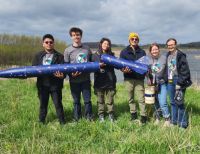Computing touches every aspect of teaching and learning at MIT, and the humanities are no exception, with scholars across disciplines using computational tools to answer critical questions in humanistic research. MIT is uniquely positioned to innovate in the digital humanities, with widespread skills in coding and deep engagement in the humanities. Bridging the gap — creating a “bilingual” community, as MIT President L. Rafael Reif calls it — to make connections across diverse research interests will be one key to success.
Now, a new collaboration between the MIT Programs in Digital Humanities (DH Lab) and the MIT Libraries is helping foster relationships among scholars with intersecting interests in computational culture. Since September 2020, the DH Lab has partnered with the libraries to present Digital Teaching and Research Collaborative Sessions, a weekly series of virtual events that provide a regular, informal space for faculty and researchers to connect with DH Lab staff, MIT librarians, and with one another. Recordings of these sessions are now available on the MIT Libraries’ YouTube channel.
“We wanted to hold open space for instructors and researchers across SHASS [School of Humanities, Arts, and Social Sciences] to meet and share their insights and experiences in online learning during this unprecedented year,” says Stephanie Frampton, associate professor of literature and faculty director of the DH Lab, founded in 2018 to build community through undergraduate research opportunities (UROPs), faculty research, visiting scholars programs, and events. “It began with a week of workshops on tools for online teaching just before the fall semester and grew into a year-long series of more than 30 events involving faculty, researchers, students, and librarians from all corners of the Institute and beyond. It’s been wonderful to see Thursday afternoons become a real touchstone for the community.”
Frampton and DH Lab Research Associate Erica Zimmer, who was instrumental in organizing and running the events, were eager to partner with the MIT Libraries’ Ece Turnator, humanities and digital scholarship librarian, and Mark Szarko, librarian for comparative media studies, literature, philosophy, and theater arts. With the pandemic prompting a switch to remote learning, both librarians had been working extensively with faculty looking to enhance teaching and UROPs with digital tools.
“Ece and Mark had already been working to bring the digital humanities forward at MIT, making people aware of tools, techniques, and case studies through IAP [Independent Activities Period] sessions, workshops, and a resource guide,” says Zimmer. “People at MIT know the libraries can help them figure out where they need to go next with a project, so their partnership has been crucial in that regard.”
“It makes sense for the libraries to be a partner in creating community around the digital humanities,” says Szarko. “MIT faculty have a wide range of research interests, and the MIT Libraries provide a sort of neutral ground for making connections across disciplines. It’s a place that welcomes everyone.”
The series started informally, with “water cooler” sessions on topics such as student engagement and strategies for teaching online. Other sessions demonstrated particular resources such as annotation, mapping, and text analysis tools, the collaborative publishing platform PubPub, or Relata, an experimental search tool for humanistic scholarship. Presentations also showcased underutilized collections at MIT, such as Archnet, a digital library developed by the Aga Khan Documentation Center. Perhaps most crucially, the series introduced participants to other scholars with similar research interests.
“I enjoyed brainstorming with fascinating new — and old — colleagues that I would not have had a chance to speak with otherwise,” says Michel DeGraff, professor of linguistics and director of the MIT-Haiti Initiative, who attended multiple events.
With an average of 25 to 30 participants at each session, the virtual events drew not only MIT scholars from various humanities fields, but also attendees from chemistry, electrical engineering and computer science, mathematics, and MIT Sloan School of Management, as well as journalists, filmmakers, and others beyond the Institute. People have tuned into the sessions, which are open to those with no prior experience using digital techniques in research or pedagogy, from at least nine different countries.
With a return to on-campus teaching and research activity projected for the fall term, session organizers are discussing ways to carry forward the strengths of the series as well as the insights and sense of community cultivated during this unusual academic year. Whatever format these discussions take in the future, their goal remains the same.
“We’re trying to create an ecosystem of knowledge and connections,” says Turnator. “The sessions are an opportunity to not only learn more about specific tools and resources but to see who else at MIT — and beyond — is interested in similar types of problems.”
The MIT Programs in Digital Humanities are generously funded, in part, by The Andrew W. Mellon Foundation.















